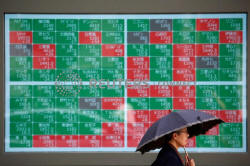Bond bulls get a boost as trade tensions fan recession
fears
 Send a link to a friend
Send a link to a friend
 [May 29, 2019]
By Sujata Rao [May 29, 2019]
By Sujata Rao
LONDON (Reuters) - The global bond rally
accelerated on Wednesday, sending 10-year U.S Treasury yields to
20-month lows, as investors fearful of the fallout from the Sino-U.S.
trade war sold shares and scurried for the safety of German and U.S.
government debt.
U.S. 10-year yields are down almost 30 basis points this month, while
German yields slipped deeper into negative territory to the lowest in
almost three years.
Wall Street was set to open lower, with S&P500 futures down 0.7%, still
feeling the effect of U.S. President Donald Trump's comment that he was
"not yet ready" to make a deal with China over trade.
Chinese newspapers responded on Wednesday with a warning Beijing could
use rare earths to strike back at the United States. China is a major
producer of rare earths, which are used widely in electronics and
military equipment.
The prospect of a prolonged standoff between the world's two biggest
economies and the likelihood of Europe and Japan getting dragged in, are
making investors seriously worried about economic growth.

Recent data, such as purchasing-manager surveys, have disappointed and
another round of tariffs would sharply raise U.S. recession risk, said
Justin Onuekwusi, a fund manager at Legal & General Investment
Management.
"The market is simply calculating what the impact will be of the next
set of tariffs as it doesn't look like the rhetoric is calming down,"
Onuekwusi said.
"Then we have a weaker growth outlook ... so we have the negative shock
of trade added to lower growth, and the cushion of protection isn't as
good as it was eight to nine months ago."
Those concerns pushed MSCI's global equity index 0.5% lower to
2-1/2-month lows <.MIWD00000PUS and put it on track for its first
lossmaking month of 2019.
Asian markets too fell while in Europe, Germany's exporter-heavy index
slumped 1.4% and a pan-European benchmark lost 1.3%.
U.S. bond and equity volatility is also on the rise.
(GRAPHIC: Bond and equity vol on the rise - https://tmsnrt.rs/2IiffRh)
On the political front too, many fear eurosceptic parties' strong
showing in EU elections could allow them to hamper crucial legislation;
Austria and Greece face elections; and Italy's dispute with the European
Commission over its budget may be escalating.
BOND RALLY ACCELERATES
All these concerns have given fresh legs to the rally in government
bonds, which will also benefit from interest rate cuts if the growth
outlook worsens.
U.S. 10-year yields are now about 13 basis points below 3-month rates,
an inversion typically seen as a leading indicator of a recession.
(GRAPHIC: U.S. Yield Curve - http://tmsnrt.rs/2zUqXiW)
[to top of second column] |

A passerby walks past in front of a stock quotation board outside a
brokerage in Tokyo, Japan, May 10, 2019. REUTERS/Issei Kato

The inversion is the deepest in almost 12 years, exacerbated by recent weak U.S.
data on manufacturing and industrial output.
U.S. rates futures are pricing two interest rate cuts by mid-2020.
"Typically when the yield curve inverts you get central bank easings. So the
question about recession would be: would the U.S. Fed ease enough to avoid a
recession?" said Chris Rands, portfolio manager at Nikko Asset Management.
"The fact that you have got a bit more noise around the trade war now at the
same time as manufacturing is rolling over -- it's getting people to think that
things are a little bit worse than they had expected," he said.
The gap between two and 10-year German Bund yields was the narrowest in almost
three years. Ten-year Bunds now yield minus 0.17% and are down 10 bps since the
start of May.
Bunds are benefiting also from tensions between Italy and the EU, which is said
to be considering punishing Rome for excessive spending.
Regardless of Italian risks, the rally spread to the riskier southern European
countries, where Spanish and Portuguese 10-year yields hit record lows and
Italian yields fell five bps.
Onuekwusi said he preferred Italian and Spanish bonds over their
negative-yielding German counterparts. The EU is unlikely to impose too severe a
punishment on Italy, he argued.
"If you look at Europe's political landscape, the last thing the (EU
authorities) would want to do is to stir up any more negative EU sentiment," he
said.
(GRAPHIC: Investors pile into Southern European debt - https://tmsnrt.rs/2WaH7QR)
On currencies, the dollar index was set for a fourth straight month of gains,
benefiting from flows away from markets such as Asia that are considered at
greater risk from a trade war.

The euro was unchanged at $.1.117 after falling two straight days. The British
pound held at $1.2643.
Commodity markets were also dominated by fears of economic downturn, with Brent
crude off almost 2% at $68.79 per barrel. But gold benefited from the safe-haven
bid, rising 0.3% to $1.282 an ounce .
(Additional reporting by Swati Pandey in Sydney; Editing by Alison Williams)
[© 2019 Thomson Reuters. All rights
reserved.] Copyright 2019 Reuters. All rights reserved. This material may not be published,
broadcast, rewritten or redistributed.
Thompson Reuters is solely responsible for this content. |